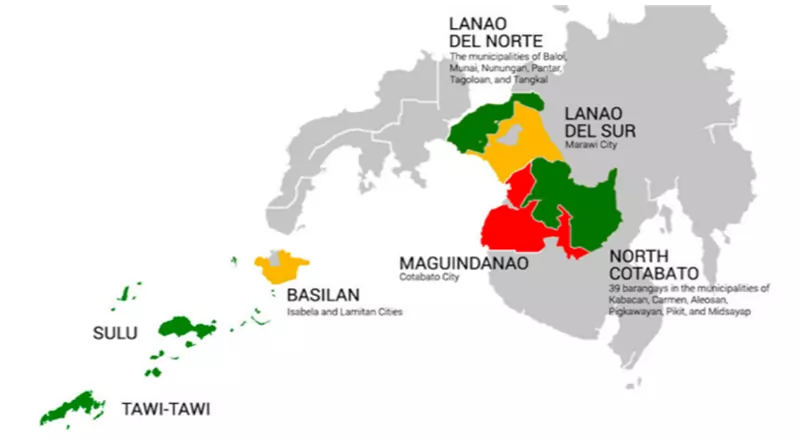(L-R) Fhaidza Laguiali, Lubaina Zainal, and Michelle Kali received family planning services from USAID-trained health care providers. They joined the URC-supported Family Planning (FP) on Wheels in Buluan, Maguindanao. Photo credit: K. Nodalo (URC)
Bangsamoro Autonomous Region in Muslim Mindanao for Health (BARMMHealth)
The Challenge
Approximately 4 million predominantly Muslim Filipinos live in the westernmost and west-central areas of the Philippines’ Mindanao Region (provinces of Basilan, Lanao del Sur, Maguindanao, Sulu, and Tawi-Tawi). During the past five centuries, armed conflict over regional autonomy has contributed to making the area the most impoverished region in the country, with low life expectancy. The region suffers from a lack of equitable access to health care and gaps in quality of health service delivery.

Inequitable gender norms have also undermined health outcomes. The country’s 2017 Demographic and Health Survey revealed that women in Mindanao are less likely to decide how to use their earnings independently and more likely to agree that husbands can hit their wives than women elsewhere in the Philippines. These socio-cultural norms result in lower health service utilization and poorer health outcomes than elsewhere in the Philippines, particularly for family planning (FP), maternal and child health (MCH), and adolescent sexual and reproductive health (ASRH).
Overview and Objectives
The USAID BARMMHealth project, implemented by URC, partnered with the Ministry of Health – Bangsamoro Autonomous Region in Muslim Mindanao (MOH-BARMM) to improve access to quality FP, MCH, and ASRH services for Bangsamoro families and communities.
BARMMHealth worked to:
- Improve social norms and strengthen healthy behaviors among underserved adolescents, youth, women, and men;
- Fortify quality of FP, MCH, and ASRH services; and
- Bolster key public health policies and systems needed to support behaviors and services for FP, MCH, and ASRH.
Achievements
BARMMHealth helped MOH-BARMM achieve the following key results:
- Delivered evidence-based messaging and campaigns across various communication platforms, including social media, 10 radio stations, community dialogue Usapan forums, and over 400 religious leader champions reaching over 1.6 million people;
- In partnership with the MOH, trained over 2,782 service providers in providing quality family planning services across the continuum of care; as a result, more than 600 service delivery points are equipped with providers trained to counsel on and provide a range of modern family planning methods to clients;
- Improved access to and quality of FP services at BARMMHealth-supported sites, contributing to more than 217,700 new modern FP users and more than 841,800 couple years of protection;
- Established continuous quality improvement systems at 88 service delivery points, at which multidisciplinary teams actively test, document, and evaluate the results of process improvements in health facilities. This initiative led to a 10% increase in service utilization between 2012 and 2022;
- Over 68,000 adolescents received adolescent-friendly health services by USAID-trained health care providers, a 121% increase since BARMMHealth’s inception. As a result of the activity’s technical assistance, 86 new health facilities are now certified adolescent-friendly health facilities;
- Supported 12 hospitals successfully integrate FP services along the continuum of care, so that couples have increased opportunity to receive respectful counseling and choose modern FP methods;
- More than 51% of people receiving FP, MCH, and ASRH services in geographically isolated and disadvantaged communities transitioned to modern FP;
- Led the discussions, formulation, and endorsement of BARMM’s Universal Health Care Implementing Rules and Regulations, signifying a pivotal step towards attaining universal health care;
- Aided MOH-BARMM in drafting implementation directives and risk communication strategies for uninterrupted FP, MCH, and ASRH services during crises, such as the COVID-19 pandemic and Typhoon Paeng; and
- Augmented the primary care provider network in Lanao del Sur and Basilan by forming alliances with 24 private health establishments, enhancing FP service accessibility in these regions.
News
- Innovation Grants Program Expands Family Planning Services in the Philippines
- Philippine Frontline Health Workers Travel Far to Provide Reproductive Health Services in BARMM
- Choosing a Family Planning Method While Breastfeeding: Philippines
- Supporting Response to COVID-19 While Continuing Essential Health Services